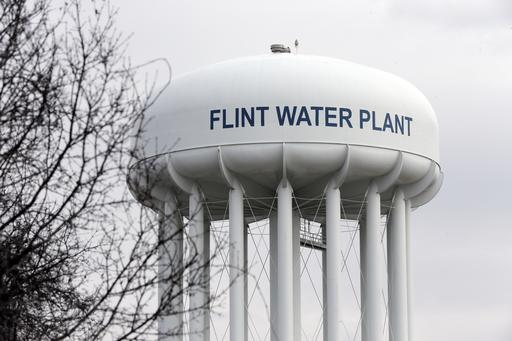
In this Friday, Feb. 5, 2016 photo, the Flint Water Plant tower is seen in Flint, Mich. Michigan Gov. Rick Snyder on Thursday, March 10, released another 4,400 pages of his executive office’s emails and documents related to the lead-contaminated water in Flint. The disclosure is the third voluntary release of such records, which have revealed his administration’s inner dialogue before the crisis and as it grew after the financially struggling city left Detroit’s water system and started using the Flint River to save money. AP PHOTO
FLINT, United States—Agence France-Presse (AFP) has launched a weekly series of reporters’ blogs taking readers behind the scenes of the 2016 US election for a look at the events and attitudes shaping the White House race.
The sixth post in the series comes from the economically depressed northern city of Flint, Michigan, where a scandal has erupted over drinking water contaminated with lead and officials’ subsequent attempts to hush up the health scare.
Flint, a black majority city of about 100,000 people that once relied heavily on the auto industry, may only be a 90-minute hop on a plane from Washington, but the difference is stark.
We leave the US capital — its tidy streets, well-dressed government officials and organic salads — to find a declining city where hopes are limited for many to just clean water, a stable job and something approaching decent health insurance coverage.
So when the people of Flint voted on Tuesday in the Michigan presidential primary, their minds were more on the poison spewing from their taps than who might win the Republican and Democratic nomination (in the event, Donald Trump was victorious for the Republicans in the state and Bernie Sanders scored a surprise win over Hillary Clinton in the Democratic race).
READ: Sanders scores upset win; Trump pulls away from foes
Flint residents were glad in a sense to be in the spotlight, a chance to tell their story and highlight their plight. More than once they thanked us journalists for being there, to give them a voice.
Plastic bottles of water seem to be everywhere in Flint. They pile up outside homes, nestled on the ground, buried in snow.
These bottles have become Flint’s lifeblood: the only way to cook, brush teeth. Soldiers and volunteers trudge through the snow distributing bottles for free, dropping them off at homes where life sometimes barely appears to flicker inside.
READ: US drinking water imperiled by failing infrastructure
Eerily empty
A year on, officials appear to have finally grasped the nettle, but it will take years to replace the corroded water pipes blamed for the lead poisoning and exactly who will pay for it remains unclear.
“What I heard and what I saw literally shattered me, and it is beyond belief that children in Flint, Michigan, in the United States of America in the year 2016 are being poisoned,” Sanders said at a CNN debate.
Experts fear a generation of sickened children in Flint, where an AFP text, video and photo team spent four days listening to presidential hopefuls promising that the city won’t be forgotten after the political bandwagon rolls out of town.
But the people of Flint could be forgiven for being just a bit skeptical and a drive out to the northern districts of the city is a disturbing reminder of the wider challenges that lie ahead.
There is poverty, decline and abandonment. Whole rows of what were once proud family homes are left empty and eerie; their windows smashed, roofs caving in, walls crumbling to the ground.
With few people left, businesses, shops and schools are effectively dead.
Rev. Daniel Moore, pastor of a local Baptist church, sums up the prevailing dispair: “The North End is primarily an African-American community, very impoverished, high crime, struggling people, but good people.”
He has harsh words for city officials, saying they are taking people to court to force them to tear down their homes. If they don’t take care of it, he says, the city will step in and do the job for them.
The city wants to raze the empty houses because they attract squatters and drug users and are also a magnet for homeless people who set fires inside to stave off the bitter cold.
With Flint’s industrial decline and high crime comes a fast-dwindling population. In some parts of the city streets are nearly empty, sadly devoid of life.
It is a far cry from its 1980s heyday after most of the General Motors factories shut down, a symbol of the decline of the US auto industry.
“We used to have 80,000 GM jobs here. Today? 5,000 jobs left,” filmmaker Michael Moore — one of the city’s best-known sons — tweeted on Sunday.
Bad decisions, bad water
Flint, like many US cities, is a place of contrasts — ghettos and affluent suburbs awkwardly rubbing shoulders.
In the city, where a third of those left are mired in poverty, the Flint River acts as a hugely symbolic dividing line (it is water from the polluted Flint River that caused pipes to become corroded).
To the south of the foul waterway are restaurants and cafes, the town hall, the Institute of Arts and the main university buildings.
To the north are cheap dollar stores, crime-ridden neighborhoods and blight. Damningly, it is there that the highest levels of lead were found in tap water.
To drive from south to north is to almost travel to a different time and place.
“It’s not a lot of money in the North side. Slow incomes. We have a lot of good people but they make bad decisions because of the low income and bad education,” Charles Marion, whose home adjoins abandoned houses, tells us.
“We know education is key, but our schools are closed. We probably had 30 school closings in the last five or so years. That’s terrible.”